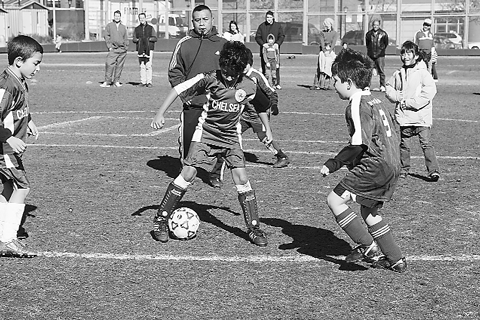By Jane Flanagan
A Downtown Soccer League game.
There are plenty of stories around of nutty parents engaged in sideline tantrums screaming at coaches. No doubt this goes on, but what interests me is something you don’t hear much about — those coaches. My son only recently started organized sports so I’ve just begun watching them up close. Lucky me.
Returning from soccer practice the other day, 6-year-old Rusty and I ran into our neighbor, Cliff Benfield. Cliff cheerfully greeted Rusty, but my son only murmured something unintelligible in return. The reason? He was in a funk. At a post-practice scrimmage his team got trounced and he was sulking.
I explained to Rusty that the point wasn’t scoring goals, but honing skills. The other team was older and no one expected his team to win, or even score. He didn’t care, he was sulking.
And now he was being rude. But while I was worried about his ill manners, Cliff was focused on something else. He was one of Rusty’s Little League coaches last spring and he saw this as an opportunity to teach him.
Cliff related a story.
He said that when Yankee shortstop Derek Jeter was his age and in Little League, he got extremely upset if his team lost. More than anyone else. A sullen young Jeter would sit by himself, head hung low, refusing to shake anyone’s hand. His father witnessed this and told Derek to throw away his glove.
“You’re not ready for team sports. Maybe you never will be,” he reportedly told his son. “We’ll buy you a tennis racquet. There’s no team in tennis, just an opponent. There’s no team to let down.”
As the story goes, the now famous shortstop picked up his glove and never threw it down again. That was the last time he sulked, too. No matter what happened, Jeter ended the game with aplomb and was the first to line up for the team handshake.
I looked over at Rusty. He was listening carefully. He then got up and respectfully said goodbye to Cliff. We got all this for free and Cliff isn’t even his coach anymore.
Speaking of free, all the Downtown Little League coaches are unpaid. When you consider how much time they donate, well, it’s a lot. There are two meetings a week — practice and the game — and all the e-mailing and organizing. Jim Porter, Rusty’s current soccer coach, is a busy sales executive and father of two. He doesn’t have a spare minute in his schedule, but when the league told him there was no one to coach his daughter’s team, he stepped in.
It was a lucky moment for us. Jim is a calm, intelligent man who knows how to encourage 6-year-olds. When Rusty first played goalie and discovered how hard it is, he burst into tears. Jim came over and explained just what a goalie is up against, and that he was proud of the job he did. My husband and I had been trying to explain the same thing but Rusty kept crying. But when the coach spoke to him, he stopped.
I was thinking about this episode later in the day at a sports birthday party. It was for 6-year-old boys. The guy running it was a high school coach, George Boutis. Boutis managed to usher them through Wiffle ball, kickball and soccer, in an hour and fifteen minutes. I was struck by how he held their attention, gained their respect and motivated them.
While he made it look easy, I had a feeling coaching was anything but.
Later, over birthday cake, Boutis agreed.
“You are standing in the middle of that court and all eyes are on you,” he said. “You’ve got 30 teenagers hanging on your words. It matters what you say.”
He explained that when he was in college, the standing joke was that you became a high school gym teacher (and coach) if you didn’t know what else to do.
“But then I started coaching,” he said.
Coaches, of course, aren’t just about encouraging and supporting. They have to deal with bad news, too. I expect good coaches are constantly juggling both.
Boutis told me the story of how a few years back out in Marin County, California, they decided that third grade was too young for children to compete. They couldn’t cope with losing.
“Third grade,” he said, widening his eyes.
He said his school even implemented the policy but it didn’t work so well.
“We did away with scores, but then after games, the kids started saying ‘we got three goals, etc.,’ and then arguing about it.”
Boutis concedes that he’s had third graders throw a fit after losing a game.
“But I sit them down and tell them, ‘sure everyone wants to win. It feels good to win. But you have a lot of years ahead of you and you will be on a winning team at some point. But today you lost. Yes, you are disappointed. But then you forget about it.’”
I have a feeling that my son will be spending a lot of time playing sports in the years to come. Lucky me.
Jane@DowntownExpress.com
WWW Downtown Express
Readmore News: https://www.amny.com/news/k-8-school-may-join-ratner-project/































